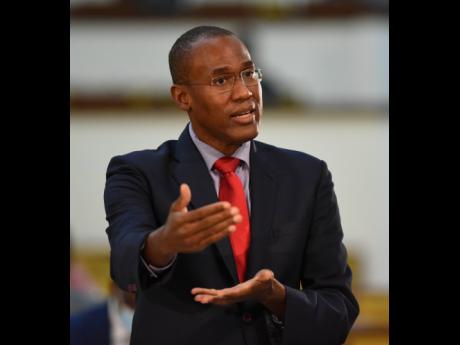FinMin sticks to inflation target in new BOJ mandate
Despite the uncertainties visited on the economy by the pandemic, the Government has made no change in the inflation target, which the central bank has been mandated to achieve as a key part of its core monetary policy responsibilities under the amended Bank of Jamaica (BOJ) Act.
In documents tabled in the House of Representatives on Tuesday, Minister of Finance and the Public Service Dr Nigel Clarke advised of the renewal of the inflation target at 4-6 per cent in a notification to BOJ Governor Richard Byles on April 16, the effective date of the amended law.
The inflation target is set based on the recommendation on the BOJ. The documents tabled by Clarke on Tuesday also included the central bank’s March 31 recommendation of the maintenance of the current target for the next three years to fiscal 2023/24.
Under the new BOJ Act, the minister is required to table in Parliament, the Government’s notification to the central bank of the inflation target. The act empowers the minister to set the inflation target in consultation with the central bank governor.
In his correspondence with the central bank, Clarke established the midpoint of 5.0 per cent as the “operational target” for the monetary policy committee, MPC, a new body chaired by the central bank governor. The target set will be reviewed at the end of the three-year period, he said.
Clarke explained that the Government’s top economic policy priorities remained the maintenance of stability in the economy, a restoration of vibrancy to economic activity and a reduction in the indebtedness of the public sector.
“I note your explanation of the risks to the MPC successfully delivering on its mandate and will seek to galvanize support in other areas of the Government towards mitigating these risks,” the minister wrote.
In its advice to the finance minister, the BOJ reported that since the setting of the current target in the 2017-18 fiscal year, the inflation rate fell within the upper band 95 per cent of the time and within the target range 59.5 per cent of the time.
The BOJ governor noted that against the background of higher energy and transport costs, inflation for the 2020-21 fiscal year ended March 31 was projected to be 6.3 per cent – above the target – but was likely to revert to five per cent over the medium term based on the economic recovery that is being forecast.
In recommending the maintenance of the target for the next three years, the BOJ pointed to what it said were the pitfalls of a lower floor than the four per cent.
“An assessment of the costs associated with targeting lower inflation (i.e. 3%) relative to the current trajectory, indicates that such a reduction will necessitate an upfront and strong adjustment of close to 200 bps in interest rates. Along with the ensuing reduction in inflation, this adjustment in interest rates will lead to reductions in both real and nominal GDP, which in turn results in a worsening of the medium-term trajectory for the debt of the public sector,” Byles wrote.
The central bank chief noted that the risks to achieving the inflation target were skewed towards adverse factors associated with a lower inflation level than four per cent. He added that the risks that could send inflation above six per cent include greater than normal exchange rate depreciation, worsening weather conditions, higher than expected global grain and oil prices, and stronger than anticipated demand recovery resulting from a successful vaccination effort and general recovery from the effects of the pandemic.
Asked what gives the Government the assurance that the inflation target is achievable given the risks outlined by the central bank, Clarke in responding to the Financial Gleaner shortly after tabling the documents in Parliament, pointed to the track record of Jamaica and the central bank in inflation targeting and control.
“Jamaica’s experience with inflation targeting has thus far been successful in that inflation outcomes have been lower than the upper band of the target 95 per cent of the time. And this was before modernisation exercise was completed,” said the finance minister.
“Now, with a modernised, operationally independent BOJ, with price stability mandated as its primary objective in law, with increased capitalisation and a robust governance, transparency and accountability framework, I am confident that this successful experience of achieving the inflation target will be continued or improved,” he told the Financial Gleaner.
Clarke added that as the country developed economically, it would be able to target lower inflation levels without the higher interest rate adjustments and risks to employment and growth outlined by the central bank.

